

Quis custodiet ipsos custodes? Jean Tirole, la concurrence imparfaite et la régulation de l’industrie électrique. 1 La régulation des entreprises en monopole Au début des années 1990s, les travaux de Jean-Jacques Laffont et Jean Tirole ont profondément et durablement transformé la théorie et la pratique de la régulation des entreprises en monopole.

Le problème est le suivant : certaines entreprises, par exemple un réseau de distribution d’électricité, sont en situation de monopole naturel. Il serait en effet inefficace pour la société de construire dans la même ville deux réseaux distribuant l’électricité. Servicios. Philippe Aghion : « La théorie de Piketty est contestable ainsi que l’analyse empirique qu’il utilise. Comment expliquez-vous le succès du livre de Thomas Piketty aux Etats-Unis ?
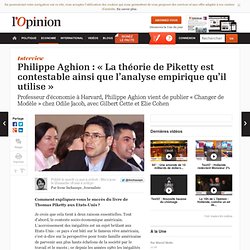
Je crois que cela tient à deux raisons essentielles. Tout d’abord, le contexte socio-économique américain. L’accroissement des inégalités est un sujet brûlant aux Etats-Unis : ce pays s’est bâti sur le fameux rêve américain, c’est-à-dire sur la perspective pour toute famille américaine de parvenir aux plus hauts échelons de la société par le travail et le succès ; or depuis les années 1980 les inégalités de revenus et de patrimoine ont crû encore plus vite que chez nous, tandis que l’accès aux biens publics tels que l’école et la santé est devenu encore plus biaisé en faveur des familles à hauts revenus.
Jugez-vous l’analyse présentée dans ce livre pertinente ? Ricardo Hausmann examines a source of capital accumulation that experts on inequality have overlooked. Exit from comment view mode.
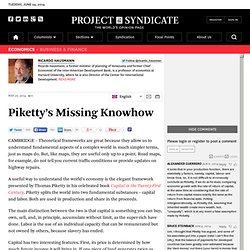
Click to hide this space CAMBRIDGE – Theoretical frameworks are great because they allow us to understand fundamental aspects of a complex world in much simpler terms, just as maps do. But, like maps, they are useful only up to a point. Road maps, for example, do not tell you current traffic conditions or provide updates on highway repairs. A useful way to understand the world’s economy is the elegant framework presented by Thomas Piketty in his celebrated book Capital in the Twenty-First Century. The main distinction between the two is that capital is something you can buy, own, sell, and, in principle, accumulate without limit, as the super-rich have done.
Capital has two interesting features. The other interesting feature of capital is that it is accumulated through savings. Piketty argues that, because the world’s rich countries are growing at less than 4-5%, they are becoming more unequal. Inequality and Shared Prosperity. The Commission on Wellbeing and Policy. It is widely agreed that GDP is an important yet insufficient measure of national success.
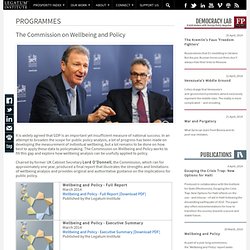
In an attempt to broaden the scope for public policy analysis, a lot of progress has been made on developing the measurement of individual wellbeing, but a lot remains to be done on how best to apply these data to policymaking. The Commission on Wellbeing and Policy works to fill this gap and explore how wellbeing analysis can be usefully applied to policy. Chaired by former UK Cabinet Secretary Lord O’Donnell, the Commission, which ran for approximately one year, produced a final report that illustrates the strengths and limitations of wellbeing analysis and provides original and authoritative guidance on the implications for public policy. The final report was launched in Berlin on Thursday, 20 March 2014 (summary), followed by a livestreamed London launch on Friday, 21 March 2014 (summary).
The Commission was politically independent, and includes an international perspective in its work. Project Syndicate: Economics, finance, politics, and global affairs from the world's opinion page. Institut d'études avancées de Paris. Environmental Economics & Indicators - Adjusted Net Saving. Adjusted net saving – a proxy for sustainability Adjusted net saving, (also known as genuine saving), is a sustainability indicator building on the concepts of green national accounts.
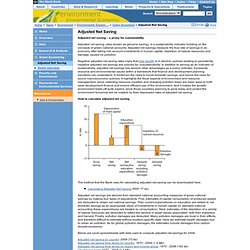
Adjusted net savings measure the true rate of savings in an economy after taking into account investments in human capital, depletion of natural resources and damage caused by pollution. Negative adjusted net saving rates imply that total wealth is in decline; policies leading to persistently negative adjusted net savings are policies for unsustainability. In addition to serving as an indicator of sustainability, adjusted net savings has several other advantages as a policy indicator. It presents resource and environmental issues within a framework that finance and development planning ministries can understand. How to calculate adjusted net saving The method that the Bank uses for calculating adjusted net saving can be downloaded here. Recursos Gratis Para Economistas!! Commission on the Measurement of Economic Performance and Social Progress - Home page.
Home. CCIT Cámara Colombiana de Informática y Telecomunicaciones. World energy & stats databases. Home > About Enerdata About Enerdata Global Energy Intelligence Enerdata is an independent Research & Consulting firm on the global oil, gas, coal, power, renewable and carbon markets established in 1991.
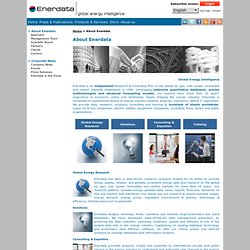
Leveraging extensive quantitative databases, proven methodologies and advanced forecasting models, our experts have more than 25 years' experience in economic, policy and technology issues shaping the energy industry. Enerdata is composed of experienced teams of energy industry experts, analysts, engineers, data & IT specialists. Global Energy Research Enerdata has been a data-driven research company trusted for its ability to provide timely, quality, reliable, and globally consistent energy data and research on the global oil, gas, coal, power, renewable and carbon markets for more than 25 years.
Solutions.